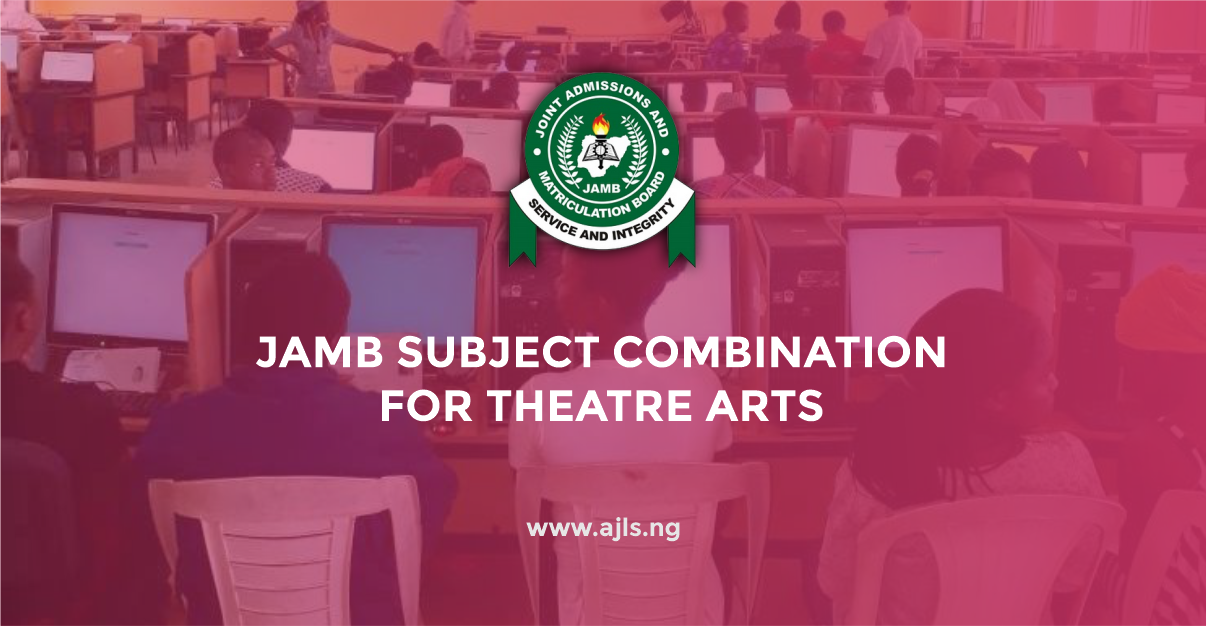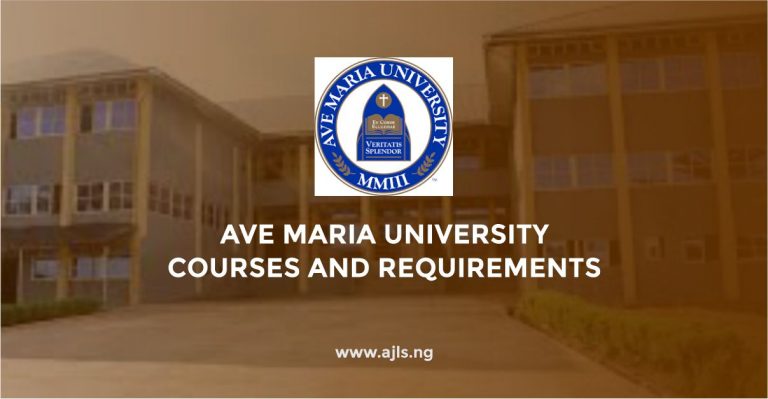JAMB Subject Combination For Theatre Arts

JAMB Subject Combination For Theatre Arts – Theatre Arts is an academic field that brings creativity to life. It involves studying drama, performance, and production, offering students the chance to express themselves while learning how to captivate audiences.
If you enjoy storytelling, performing, or acting, then pursuing Theatre Arts might be the next step in your educational path. However, before you begin, you must first choose the appropriate JAMB subject combination for this interesting course.
The entire page in this article is here to guide you all the way! We shall provide valuable information on JAMB Subject Combination For Theatre Arts, O’Level requirements, and some profound universities offering Theatre Arts in Nigeria. Pay attention to every detail on this page as it will help you make good and well-informed decisions.
JAMB Subject Combination for Theatre Arts
JAMB Subject Combination refers to the precise courses that applicants must take in the Joint Admissions and Matriculation Board (JAMB) test, based on the course they choose to pursue at university.
The appropriate subject combination is very very important as it guarantees that your academic background matches the requirements of your preferred program. To study Theatre Arts in any Nigerian university, the following are the correct JAMB Subject Combination for Theatre Arts:
- English Language (compulsory for all courses).
- Literature in English (essential for understanding plays, novels, and poetry).
Any two of the following:
- History
- Government
- Religious Studies
- Fine Arts
- Music
This combination reflects the course’s creative and analytical demands, emphasizing language, culture, and artistic appreciation.
Choosing the correct subjects ensures your eligibility for admission and sets the foundation for your Theatre Arts studies. It also highlights your commitment to the arts and aligns with the requirements of top universities.
O’Level Requirements
You’ll also need at least five (5) O’Level credits, including:
- English Language
- Literature in English
- And three other relevant subjects (such as History, Government, or Religious Studies).
These credits must be obtained in no more than two sittings.
Direct Entry Requirements for Theatre Arts
Candidates seeking Direct Entry admission into Theatre Arts programs in Nigerian universities must meet the following requirements:
- A minimum of two (2) A-Level passes in Arts or Social Science subjects, such as Literature in English, History, or Government.
- A National Diploma (ND) or National Certificate in Education (NCE) in relevant fields such as Theatre Arts, Performing Arts, or Mass Communication with at least a Merit or Upper Credit grade.
- Candidates must also satisfy the basic O’Level requirements, including at least five (5) credits in subjects like English Language (compulsory), Literature in English, and Three other relevant subjects (e.g., History, Government, or Fine Arts).
- Applicants must purchase the JAMB Direct Entry form and select Theatre Arts as their preferred course.
Note: The UTME subject combination for Theatre Arts also applies to similar courses, including:
- Drama/Dramatic/Performing Arts
- Theatre and Performing Arts
- Theatre and Film Studies
- Theatre Arts
- Performing Arts
- Theatre and Media Arts
- Performing Arts and Culture
- Film Arts
These courses share a common focus on creativity, performance, and cultural expression, making the subject requirements interchangeable. Ensure you confirm specific requirements from your chosen university.
JAMB Cut-Off Marks for Theatre Arts
The JAMB cut-off mark is the minimal score needed on your JAMB exam to be considered for admission to a university’s Theatre Arts program. These cut-off grades differ amongst universities, indicating the competitiveness of the course. The following is a list of JAMB cut-off marks for Theatre Arts and associated degrees at major Nigerian universities:
| University | Course | JAMB Cut-Off Mark |
|---|---|---|
| Akwa Ibom State University of Technology | Performing Arts | 180 |
| Elizade University | Performing Arts | 180 |
| Olabisi Onabanjo University | Performing Arts | 180 |
| Kwara State University | Performing Arts | 180 |
| University of Ilorin | Performing Arts | 180 |
| Afe Babalola University | Theatre Arts | 180 |
| Bowen University | Theatre Arts | 180 |
| Gregory University | Theatre Arts | 180 |
| Benue State University | Theatre Arts | 180 |
| Igbinedion University | Theatre Arts | 180 |
| Nasarawa State University | Theatre Arts | 180 |
| University of Port Harcourt | Theatre Arts | 180 |
| Plateau State University | Theatre Arts | 180 |
| Redeemer’s University | Theatre Arts | 180 |
| Nnamdi Azikiwe University | Theatre Arts | 180 |
| University of Uyo | Theatre Arts | 180 |
| Imo State University | Theatre Arts | 180 |
| Kogi State University | Theatre Arts | 180 |
| University of Calabar | Theatre Arts | 180 |
| University of Ibadan | Theatre Arts | 200 |
| Niger Delta University | Theatre Arts | 180 |
| Elizade University | Performance and Film Arts | 180 |
| University of Nigeria | Theatre and Film Studies | 200 |
| University of Jos | Theatre and Film Studies | 180 |
| Adekunle Ajasin University | Theatre and Media Studies | 180 |
| Evangel University | Theatre and Media Studies | 180 |
| Federal University, Oye-Ekiti | Theatre and Media Studies | 180 |
The cut-off marks for Performing Arts and related courses are relatively consistent, with most universities requiring a minimum of 180. However, more competitive programs, like Theatre Arts and Film Studies, might have a higher cut-off mark, especially at top-tier institutions.
List of Nigerian Universities offering Theatre Arts in Nigeria
Here is a list of Nigerian Universities offering Theatre Arts:
- Afe Babalola University, Ado-Ekiti (ABUAD)
- University of Benin (UNIBEN)
- Bowen University, Iwo (BU)
- Benue State University, Makurdi (BSU)
- University of Calabar (UNICAL)
- Chukwuemeka Odumegwu Ojukwu University, Uli (COOU)
- Delta State University, Abraka (DELSU)
- Ekiti State University (EKSU)
- Evangel University, Akaeze (EVANGEL)
- Federal University, Lafia (FULAFIA)
- Gregory University, Uturu (GUU)
- Ignatius Ajuru University of Education, Rumuolumeni (IAUE)
- University of Ibadan (UI)
- Igbinedion University, Okada (IUO)
- Imo State University, Owerri (IMSU)
- Kaduna State University (KASU)
- Kogi State University, Anyigba (KSU)
- Michael and Cecilia Ibru University (MCIU)
- Nasarawa State University, Keffi (NSUK)
- Niger Delta University, Yenagoa (NDU)
- Plateau State University, Bokkos (PLASU)
- Redeemer’s University, Nigeria (RUN)
- Rivers State University (RSU)
- University of Africa Toru Orua, Bayelsa State (UAT)
- Osun State University, Osogbo (UNIOSUN)
- Nnamdi Azikiwe University, Akwa (UNIZIK)
- University of Uyo (UNIUYO)
These universities provide excellent opportunities for aspiring Theatre Arts students to hone their craft and make meaningful contributions to the creative world. When choosing a university, consider factors like location, facilities, and program focus to find the best fit for your ambitions.
Conclusion
Studying Theatre Arts allows you to explore your creative side while developing skills that can inspire and transform society. By selecting the right JAMB subject combination and preparing adequately, you’re setting yourself on a path to achieve your dreams in the Art industry.
Theatre Arts will provide you with the skills you need to bring your idea to life, whether you want to perform on stage, create screenplays, or direct compelling shows!
We hope this article was impactful. We wish you success in your admission process. Feel free to reach out to us anytime for more updates and drop your questions and suggestions in the comment box, and we will respond to them right away.
Frequently Asked Questions (FAQs)
What are the required JAMB subjects for Theatre Arts?
English Language, Literature in English, and any two other arts or social science subjects.
Is Literature in English mandatory for Theatre Arts?
Yes, Literature in English is a core subject for Theatre Arts programs.
Can I substitute any other subject for Literature in English?
No, most institutions require Literature in English as a prerequisite.
What are the recommended O’level subjects for Theatre Arts?
Five credits, including English Language, Literature in English, and three other arts or social science subjects.
Can I study Theatre Arts with a science background?
Yes, as long as you meet the required subject combination and O’level credits.
Do all institutions have the same subject requirements?
No, some universities may have additional requirements. Check with your chosen institution.
What if I don’t have Literature in English in my O’level?
Consider taking another O’level exam or selecting a different course that matches your qualifications.





